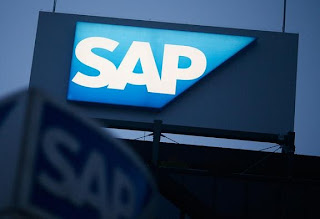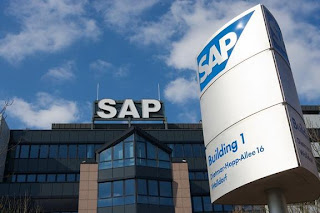So it looks like when Germany's most valuable listed company is trying to reinvent itself: Throbbing house music, flashing strobe lights. From the ceiling of the sports arena of San Jose, a man abseils off in the shark costume, the mascot of the local hockey team.
Thousands of SAP
employees yell, clap, and whistle. Early in the morning they had been trucked
in buses from the nearby Silicon Valley branch of the group to attend the
renaming of one of the largest event venues in Northern
California. It is now no more Hewlett Packard Pavilion, but SAP Center.
The mood is in
high spirits. Jonathan cup, global chief marketing officer, takes the stage. He
shouts into the microphone: "We no longer want to contribute to better Control
Company. We want to re-invent the world we are a force to be reckoned with."
Start-ups are
being courted heavily
My colleague
Michaela Schiebl and I have spent the past few weeks for a large recent report
in the Spiegel much time at SAP. We have, of course, Hasso Plattner talked to
management and supervisory boards, developers and councils and. We have thereby
experienced a company that is changing radically. Development cycles are
radically shortened from years to weeks. Rather than less massive software
packages for corporations countless small apps are asking for everything and
everyone. Start-ups and third-party developers are heavily courted.
"Intellectual
renewal" is the buzzword that is heard everywhere these days at SAP. It is
causing Vishal Sikka, chief technology chief of the group and pupil of the
founder patriarch Hasso Plattner. Sikka grew up as the son of an Indian railway
worker on his doctorate at the elite university Stanford and founded two
successful start-ups before joining SAP in 2002. The Indian says that he feels
very comfortable in a group with "German soul". In his office is a
signed photo of Steffi Graf, the idol of his youth. He likes to quote from
Hermann Hesse's "Siddhartha" or philosophize about quantum theory and
Albert Einstein.
"Direct
contact with consumers"
Sikka to think
for the detail-oriented group in large sheets. "All things are
increasingly being replaced by digital, atoms to bits, this is the great
transformation that is currently taking place around us all around," says
Sikka. "We are increasingly governed by software." Is the task of the
SAP is to support this process, "to help the world, to reinvent themselves
through software."
Mainly thanks to
the success of Hana, the new group of database technology. With their large
amounts of data can be analyzed much faster than before. SAP can now
"build completely new things we have never done before, which were also
technically not possible in many cases." Sikka says that SAP would not be
more restricted to enterprise software. He speaks of applications for
healthcare, sports and expectant mothers. It is "to maintain direct
contact with the consumer."
Thus, SAP has
recently built about an application for the San Francisco 49 years; with the management
of the football team analyzes new player purchases. An app for the American
professional basketball league NBA player prepares statistics.
"You can
develop hereby sell and what do you want"
In addition:
Hana is a platform, an "open ecosystem," said Chief Marketing Officer
Becher. SAP is the first time no longer restricted to their own developers.
"We are therefore outside to thousands of small and large companies and
offer: You can develop and hereby sell what you want."
Nearly 500
start-ups, the Group was able to win it, to develop software based on Hana -
including some applications to high-speed trading on exchanges or
troubleshooting for robots. "Our goal must be to be able to inspire every
software developer on the planet for our ecosystem," says Becher.
"Forced to
speed"
But the big
plans mean: Everything has much, much faster. "People have become
impatient with technology," says Sikka. He cites the example Waze, a
navigation app developed by a small Israeli company. "Within a year, had
millions of users." A few weeks ago Google bought the company for about a
billion dollars.
"New
products are being accepted in an incredibly short time," says Sikka. The
rules for the IT industry have changed dramatically in recent years.
Improvements need to be served in small, bite constant instead of a huge
update. Who can be too much time, is outdated. At SAP, you've seen enough of
that in the past ten years: "Many of our products have not worked."
The new philosophy at SAP so hot: "Forced to speed."
However, with
the speed increases the pressure. Many feel as increasingly remote coding
enslave given the required tempo. "The employees are burned out,"
complains Works Ralf Kronig and refers to the increasing number of long-term
sick leave in the company. The impact rate is still rising but rather the
future. The goal for 2020: a profit margin of 35 percent.









